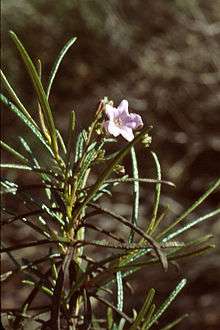Eriodictyon altissimum
| Eriodictyon altissimum | |
|---|---|
 | |
| Scientific classification | |
| Kingdom: | Plantae |
| Clade: | Angiosperms |
| Clade: | Eudicots |
| Clade: | Asterids |
| Order: | Boraginales |
| Family: | Boraginaceae |
| Genus: | Eriodictyon |
| Species: | E. altissimum |
| Binomial name | |
| Eriodictyon altissimum P.V.Wells | |
Eriodictyon altissimum is a rare species of flowering plant in the borage family known by the common name Indian Knob mountainbalm. It is endemic to San Luis Obispo County, California, where it is known from only about six occurrences in the Irish Hills on the coast and nearby Indian Knob.
Description
This is a shrub growing erect to a maximum height near 4 meters. It has shreddy bark on its larger branches and stems and a sticky exudate on its smaller twigs. The very narrow, linear leaves are up to 9 centimeters long, white-hairy on the undersides and hairless and sticky on top. The inflorescence is a curled cluster of bell-shaped lavender flowers each just over a centimeter long. The fruit is a small capsule containing many tiny seeds.
Conservation
It grows in scrub, oak woodland, and chaparral habitat on sandstone soils. When the plant was federally listed as an endangered species in 1994, there were fewer than 600 individuals known to remain.[1] This plant sometimes occurs with the also threatened endemic Morro manzanita (Arctostaphylos morroensis).[1] There are occurrences on protected land within Montaña de Oro State Park and the Morro Dunes Ecological Reserve.[2] When the plant was listed as an endangered species the main threat to its survival was habitat destruction; by 2009 enough of the plants were located on protected land that this is no longer considered a major threat.[2] For this reason, the United States Fish and Wildlife Service has recommended that the species be downlisted to threatened status.[2]
References
- 1 2 USFWS. (1994). Endangered or Threatened Status for Five Plants and the Morro Shoulderband Snail From Western San Luis Obispo County, California. Federal Register.
- 1 2 3 USFWS. Eriodictyon altissiumum Five-year Review. February 2009.
External links
- Calflora Database: Eriodictyon altissimum (Indian knob mountainbalm)
- Jepson eFlora (TJM2) treatment of Eriodictyon altissimum
- UC CalPhotos gallery
